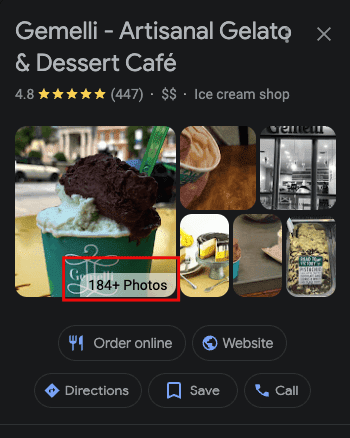What is local SEO?
Local SEO is a strategy that involves optimizing your website for local searches. These are searches people conduct when they want to find a business near them. Local SEO helps you optimize your business’s presence so you appear in more of these searches.
In this local SEO guide, we’ll continue to explore several aspects of local SEO, including the following topics:
- When to use local SEO
- Local SEO benefits
- Local SEO ranking factors
- Local SEO strategies for 2026
- Local SEO FAQs
For a general overview of local SEO, you can check out this helpful video:
Now let’s dive into the full local SEO guide!
When to use local SEO
First up, let’s talk about who should use local SEO.
If any of the following apply to your B2B or B2C company, you’ll want to invest in local SEO:
Let’s dive into each of those a little more.
1. You serve local customers
If you serve customers in your local community, you’ll want to invest in SEO for local services. It’s particularly effective for service-based businesses like doctors, realtors, and restaurants, as well as for industries like financial advisors and banks who need to build trust within a specific geographic community. Now, I know what you’re thinking: “I already have local customers frequenting my business, so why bother?”
Even though you have local customers already, not all of your potential customers know about your business. There are still plenty of other people in your local area that you could convert. Not to mention, people frequently move to new locations, which means new potential leads are always arriving.
So, if you serve customers in your immediate local area, local SEO is a must. Having a local presence is essential for keeping your brand top-of-mind for local customers.
2. You’re looking to earn new customers
If you want to earn new leads that turn into customers, local SEO is one of the best ways to do it. Local SEO helps you rank in searches where people are looking for businesses in their area.
People commonly move to new areas or visit them for the first time. Some of those people will be looking for a business in your industry, and when you have a strong local presence, that helps them find you.
Imagine that you’re traveling out of state and your car has trouble. You need to find a reliable mechanic in the area. You’re going to turn to Google to help you find one, and you’ll likely pick the top-ranking (and top-rated) result. Now imagine people doing that in your industry. If your business is the top-ranking option in local searches, you’ll be the one that all those prospects go to.
So, optimizing for local SEO — especially with the help of experienced local SEO agencies — is a key component to helping you earn new customers.
3. You have a lot of local competitors
If you have a lot of competitors in your area, you’ll want to invest in local SEO. Odds are, they’re already doing it themselves, so if you neglect it, you’ll fall behind the curve. And if they’re not using local SEO, it’s the perfect opportunity for you to get an edge over them.
Think of it like this: Imagine you run a burger joint. Someone visiting your area decides they want to grab a burger to eat. They search for a local burger place near them, and your business appears in the local 3-pack near the top of search results. The searcher sees your glowing reviews and mouth-watering photos, so they decide to visit and try your food.
Now imagine if you didn’t optimize for local search. That searcher would have found a competitor’s place and visited them instead. And when that happens on a larger scale, you lose out on a lot of potential revenue. So, if you want to remain competitive in your market, optimize for local SEO.
Local SEO benefits
Local SEO is important for a few reasons, including the following:
- It reaches prospects with an immediate need
- It finds people early in the buying journey
- It earns you more buyer trust
- It eases conversion pain points
- It reaches a more specific audience
Let’s look at each of those benefits in a little more detail.
1. It reaches prospects with an immediate need
When people conduct local searches like “pest control company near me,” it’s often because they have an immediate need for your services. That means they’re likely to convert quickly, and many of them will simply go with the first company they see ranking. That makes local SEO incredibly valuable for reaching those prospects.
2. It finds people early in the buyer’s journey
Many local searches happen pretty early in the buyer’s journey, when people are just starting to consider different businesses. By using local SEO to throw your hat into the ring early on, you can get people thinking about your brand right from the jump, giving you a head start over your competitors.
3. It earns you more buyer trust
Part of local SEO is putting more info about your business online, particularly on your Google Business Profile. When people searching for businesses in your area see all that info on your profile — including reviews left by your existing customers — they’ll be more likely to trust you than, say, a competitor with an incomplete profile.
4. It eases conversion pain points
On top of increasing trust, your local search presence makes it a lot easier for users to get the information they’re looking for and convert when they’re ready. Those are common pain points that are eased up when you take steps like optimizing your Google Business Profile.
5. It reaches a more specific audience
When you use normal SEO, there’s a chance that you’ll reach people well outside of the area you serve. That means some of your SEO efforts could be wasted on irrelevant users. But with local SEO, you’re specifically focusing on your local region, where you know you’re reaching your target audience.
Local SEO ranking factors
Local SEO works by using SEO ranking factors, including localized ones. Some of those factors are:
- GBP optimization: The more thoroughly filled out your Google Business Profile is, the better Google can determine which search results to rank it in, and the higher it will rank.
- Reviews: The more reviews you have (and the more positive those reviews are), the better your Google Business Profile will rank.
- Local on-page SEO: Your Google Business Profile is a big part of local SEO, but you can also optimize your website content by taking steps like integrating local keywords and making location-specific pages.
Search engines like Google use these ranking signals to generate local search results. Localized search results pages differ from non-localized ones by featuring what’s called a local 3-pack, which is a carousel of Google Business Profile listings.
Local SEO strategies for 2026
Now let’s look at some of the specific elements that go into a local SEO strategy. There are several tactics you should be sure to use, including:
- Claim and optimize your Google Business Profile
- Create localized website content
- Maintain a consistent NAP
- Manage reviews
- Build a localized backlink profile
You can check out this video for some additional tips:
Now, let’s get into the details of each of those tactics below.
1. Claim and optimize your Google Business Profile
A key component of any good local SEO guide is your Google Business Profile. Since this profile only appears when people conduct local searches, it’s crucial that you spend time optimizing this feature.
Start by claiming your Google Business Profile and add the following information:
- Name
- Address
- Phone number
Once you claim your profile, you’ll want to start optimizing it to rank in search results. Here are some ways to optimize your Google Business Profile:
- Use your business’s proper name: Don’t use a nickname for your business profile. Even if everybody calls your place “Kirk’s,” your listing should say “Kirkland’s Pub.”
- Verify your hours: Having the wrong operating hours leaves people annoyed with your business. Make sure your hours are accurate, and update them if they change.
- Add photos: Did you know that Google Business Profiles that have 100 or more images get 1065% more website clicks and 520% more phone calls? Adding photos of your products, team, and business will help boost engagement.

In addition to a Google Business Profile, you should claim or create a Bing Places profile, which is Microsoft’s version of the same thing.
2. Create localized website content
While local listings like Google Business Profile are fantastic for attracting local traffic, you ultimately want that traffic to go to your website. That’s why it’s important to optimize your website content, too.
On your site, you can create localized content like:
- Blog posts that highlight local events, like a seasonal parade
- Sales content that highlight local services for the area, like a city, county, or state
While generating this content, especially evergreen content, it’s important to make your localized content unique. Mention the area’s landmarks, for example, or include images specific to the area. If your localized content is too similar, you won’t see the benefits from this local SEO strategy.
To help your localized content rank in relevant search results, it’s also important to target local keywords. If you have an ice cream store, for example, a local keyword would be “ice cream shop in Austin” or “ice cream near Austin.” Local keywords can also end in “near me,” so you could target “ice cream near me.”
Use keyword research tools like Soovle, Keyword Generator, Google Keyword Planner, Keywords Everywhere, and more to help you identify the right local keywords. Once you discover the most relevant keywords, you can start targeting them in your local listings.
3. Maintain a consistent NAP
One of the biggest local SEO basics you need to know is that you should check your name, address, and phone number (NAP) across the web. This core information is what people need to know about your business.
Your personal information appears numerous places on the web. It’s important that, no matter where people find you, they get accurate information. That means you need to check every platform and directory where your NAP information is shared so you can verify it’s correct.
You can also use a tool like LocalFX to help you check across the web and fix any mistakes. If you partner with a local SEO company or specialized local SEO provider — like a franchise SEO agency — they’ll often have these tools available.
P.S. Own multiple locations? You can create separate local listings for each location — like one Google Business Profile for your location in Philadelphia and another Google Business Profile for your location in Pittsburgh — to maintain a consistent NAP.
4. Manage reviews
Let’s talk about earning reviews. Reviews play a critical role in convincing people to choose your business, telling people whether you’re a good choice for what they need.
Reviews also impact your Google Business Profile. When you have more reviews and more positive feedback, you have a better shot at appearing in the local 3-pack.
So, how do you earn reviews?
When customers buy from your business, you can invite them to leave a review on Google. If they follow you on social media, you can also encourage them to share their experience there. It’s a great way for you to build up your reviews.
As you work to earn reviews, keep in mind that you won’t receive five-star reviews every time. People use reviews to leave feedback for businesses — good or bad.
While you could leave negative reviews as-is, it’s important to respond to them. Acknowledge the user’s experience and work with them to resolve it, whether by making internal changes, offering a refund, or speaking to them through a private channel.
5. Build a localized backlink profile
Just like traditional SEO, local SEO uses backlinks to boost visibility in search results. According to Google, search prominence is “based on info like how many websites link to your business and how many reviews you have.” That means it’s important to have good backlinks leading to your site.
Grow your localized backlink profile with local SEO tactics like the following:
- Sponsor or support your community’s local events, charities, or sports teams
- Join your area’s Chamber of Commerce
- Partner with other local businesses
- Host community-specific events, like fundraisers or cookouts
Your traditional SEO efforts can also help you grow your backlink profile from sites across the globe. Together, the two will help build your reputation and trust with search engines like Google, which can lead to higher rankings.
Local SEO FAQs
To wrap up our guide to local SEO, here are the answers to some of the most commonly asked questions about local SEO:
What is local SEO?
Local SEO is a form of SEO that focuses on reaching local prospects in search results. You can boost your local SEO by optimizing your Google Business Profile and targeting local keywords on your website.
What is the difference between local SEO and traditional SEO?
Local SEO is a subset of traditional SEO. Whereas SEO more broadly is about getting your site to rank in relevant search results, local SEO focuses specifically on searches conducted in (or related to) your local area.
Why is local SEO important?
Local SEO is essential for reaching the prospects in your local area. Those prospects will perform local searches when they need your services, and if you don’t optimize to appear in those searches, your prospects will end up finding a competitor there and choosing them instead.
What are the benefits of local SEO?
The benefits of local SEO include the following:
- It targets people with an immediate need
- It reaches prospects early in the funnel
- It increases buyer trust
- It makes conversions easier
- It targets a more precise audience
What are the top local SEO ranking factors in 2026?
The three biggest local SEO ranking factors in 2026 are:
- Google Business Profile optimization
- Reviews (both quantity and quality)
- Local on-page SEO tactics
How can I track the success of my local SEO strategy?
The best way to track your local SEO results is to use a tool like Google Search Console to see how you’re performing in rankings. By looking specifically at local searches, you can see how your web content and your Google Business Profile are performing. You can also use Google Analytics to see how much traffic your website is receiving from local searches.
You can use these tools to monitor metrics like:
- Rankings
- Impressions
- Clicks
- Traffic
What are local SEO services?
Local SEO services are exactly what they sound like — they’re services offered by professional SEO agencies that focus on improving your presence in local search results. These services typically involve:
- Improving your Google Business Profile
- Creating localized content on your website
- Earning local backlinks
- And more!
Revitalize your local SEO strategy
Local SEO is an important strategy to use to drive local customers to your business. Using tactics like local keyword targeting and Google Business Profile optimization, you can optimize for Google’s ranking algorithms and skyrocket your local search visibility.
Of course, managing a local SEO strategy can be a lot of work. So, if you want help from the experts with your strategy, we’ve got your back. Check out our local SEO services to see how our team can help you dominate the search results for your area, and contact us online for a free quote!
Reach More Local Customers, Faster
Expand your local reach with proven strategies from our local SEO experts. Request your custom local SEO strategy today!


Reach More Local Customers, Faster
Expand your local reach with proven strategies from our local SEO experts. Request your custom local SEO strategy today!
Reach More Local Customers, Faster
Expand your local reach with proven strategies from our local SEO experts. Request your custom local SEO strategy today!
Writers

What to read next
- Jan 06, 2026
- 5 min. read
- Dec 24, 2025
- 8 min. read
- Dec 22, 2025
- 9 min. read


